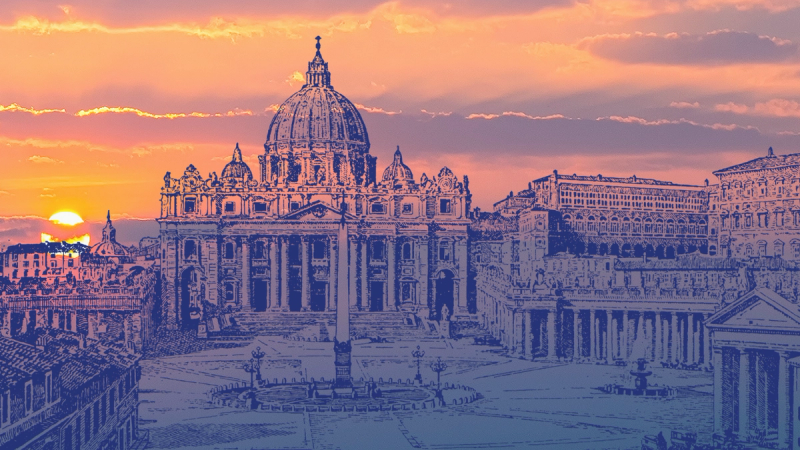The Roman Catholic church has been in the news a lot lately, most recently with the death of Pope Francis and the election of a new pontiff, Leo XIV.
Leo XIV, formerly Robert Prevost, a cardinal originally from Chicago, is the first American pope and the first who belongs to the Augustinian order. Many are speculating about whether he'll continue pursuing the policies of his predecessor or choose a different path as leader of the world's estimated 1.4 billion professing Roman Catholics.
Personally, I think this is a significant moment for those of us who belong to Reformation traditions as well—not because we acknowledge the pope's authority, of course, but because this election only adds to the increasingly high profile of Roman Catholicism (especially of the traditional kind, more conservative than the new pope). Many folks are paying attention to what the new pope will say and do; many are listening attentively to the claims of Rome.
Not By Faith Alone: The Roman Catholic Doctrine of Justification
by Michael Horton and Robert SungenisIn this friendly, fascinating interview, Michael Horton interviews Robert Sungenis on the distinctives of Roman Catholic interpretation of the Bible and its major theological differences with the Reformation over justification by faith and related themes.
Think about it: right now, Roman Catholic theology and practice is being presented and discussed and explained and defended on national news. This is obviously a major opportunity for Rome. But what if we see this as a major opportunity for the Reformation, too?
In his first speech and then his first sermon as pope, Leo spoke of the peace of God that we receive only through Jesus our Good Shepherd. He spoke of the centrality of the gospel and of hope found in no one else but Christ. He stressed the importance of missions and of service, humility, and love. These emphases will resonate with every Christian.
But Leo also claimed to be Peter's successor as the authoritative head of the church. He called the crowd to pray to Mary to ask her for the "special grace" to "help us with her intercession and her love," before leading them in the Hail Mary:
Hail, Mary, full of grace,
the Lord is with thee.
Blessed art thou amongst women
and blessed is the fruit of thy womb, Jesus.
Holy Mary, Mother of God,
pray for us sinners,
now and at the hour of our death.
Amen.
Can We Be Confessional and Catholic?
by Michael HortonMichael Horton turns his eye toward each major confession in the Western church and asks each of us to reflect on how to be faithful to our convinctions while pursuing unity in the truth. "While visible, organic union of denominations is not likely any time soon," Horton admits, he still calls us to ask ourselves, "should we not create more forums in which greater understanding, mutual admonitions, and fruitful partnerships can emerge wherever possible without violating the integrity of each group's confession?"
Leo has a reputation for being an outspoken proponent of Marian devotion and the Rosary. When Pope Francis was seriously ill earlier this year, then-Cardinal Prevost was one of those who led the faithful gathered at the Vatican to pray the Rosary on the pope's behalf. As the Vatican News summarized Prevost's message to the faithful: "Let us entrust the Pope to Mary."
A message, maybe, but not what Reformation and evangelical Christians would call a gospel message. Such claims and practices are diametrically opposed to the exclusivity of salvation by grace alone through faith alone in Christ alone, according to the ultimate authority of Scripture alone.
Canon and Catholicism
by Leon M. BrownLeon Brown reminds us that the differences between the Reformation and Rome don't arise only at the level of biblical interpration; we even have different Bibles. Brown looks at the history of the Apocrypha, which Roman Catholics consider canonical—and why Protestants don't.
If we're honest, most of us will answer, "Not familiar enough." If that's you, I've compiled the select list of essays from the Modern Reformation archives here to help you get oriented—or to help refresh your memory and sharpen your understanding. You can also share them with Roman Catholic friends (or friends who have become Catholic-curious).
Ten Theses for Roman Catholic-Evangelical Dialogue
In this manifesto, the MR editors present a list of 10 crucial areas of agreement, disagreement, and discussion between the confessional heirs of Rome and the Reformation.
One more thing: this cultural moment isn't an opportunity to dunk on Roman Catholics. It's not an opportunity to pat ourselves on the back for being right. It's an opportunity to present the full riches of the truth of the gospel to those who either don't know it at all (like many secular people who have become unusually open to discussing these matters), or to those who have encrusted it with deep errors and self-contradictions (like many Roman Catholics). Finally, it's an opportunity for those of us who do have a rich Reformational grasp of the good news of Jesus to be humbled and grateful as we remind ourselves and one another how gracious God has been to save even sinners like us, to his glory alone.







